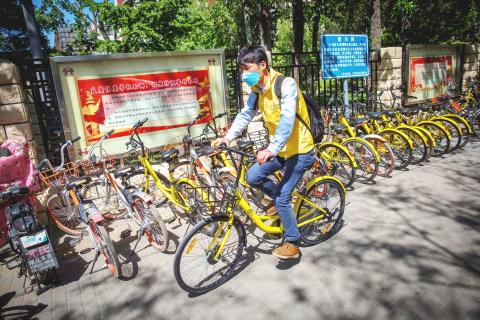Didi Chuxing (滴滴出行) may have just upped the ante in the Chinese bike-rental wars, taking one of the industry’s largest and fastest-growing players under its wing.
The ride-hailing giant yesterday said it has integrated Ofo’s (共享單車) service into its own mobile app, granting the start-up access to the 400 million users across 400 Chinese cities that already use Didi to summon cars and taxis.
That pits it against Tencent Holdings Ltd (騰訊), a prominent backer of Ofo’s archrival, Mobike Technology Co Ltd (摩拜科技).

Photo: EPA
Didi will allow users to rent Ofo’s bright-yellow bicycles from within the popular app.
That is the first step in “extensive” future collaboration as the ride-sharing giant promotes Ofo’s name across China, Didi said in a statement.
The arrangement mirrors the way Tencent’s WeChat (微信) — China’s most popular social media service — integrated Mobike’s service into its wallet interface last month.
Formally known as Beijing Bikelock Technology Co, Ofo has adopted Didi’s take-no-prisoners approach to expansion. It has amassed US$650 million in funding and obtained an estimated valuation of more than US$2 billion.
With backing from Digital Sky Technology and the country’s largest online financial company, Ant Financial Services Group (螞蟻金服), it plans to expand to 20 countries and about 200 cities in China this year. In Mobike’s camp is Temasek Holdings Pte and Hillhouse Capital Management.
Both are taking their rivalry global: Mobile has pledged to expand in Europe on top of expanding to 100 cities in China this year.
The battle, carried out with costly subsidies and even free rides for users, has thrown the industry into bubble territory, Ofo’s cofounder Zhang Siding (張巳丁) said this month. At least 25 companies are providing similar services in China.
Didi is near an agreement to raise at least US$5 billion in a deal that would make it the most valuable start-up in China, according to people familiar with the matter.
The round may close as soon as this week and would lift Didi’s valuation to about US$50 billion, up from a previous US$34 billion after its acquisition of Uber Technologies Inc’s China business, said one of the people, asking not to be identified because the matter is private.
That would make Didi the most valuable start-up in the world after Uber. Didi’s investors include Softbank Group Corp, Silver Lake Kraftwerk, China Merchants Bank Co (招商銀行) and an arm of Bank of Communications Co (交通銀行), the people said.
The deal is aimed at giving the Beijing-based Didi sufficient capital to pursue an ambitious agenda in China and beyond.
While the four-year-old start-up has so far focused on ride-hailing services, it is looking to expand into more countries and invest in technologies from autonomous driving to artificial intelligence.

SEEKING CLARITY: Washington should not adopt measures that create uncertainties for ‘existing semiconductor investments,’ TSMC said referring to its US$165 billion in the US Taiwan Semiconductor Manufacturing Co (TSMC, 台積電) told the US that any future tariffs on Taiwanese semiconductors could reduce demand for chips and derail its pledge to increase its investment in Arizona. “New import restrictions could jeopardize current US leadership in the competitive technology industry and create uncertainties for many committed semiconductor capital projects in the US, including TSMC Arizona’s significant investment plan in Phoenix,” the chipmaker wrote in a letter to the US Department of Commerce. TSMC issued the warning in response to a solicitation for comments by the department on a possible tariff on semiconductor imports by US President Donald Trump’s

The government has launched a three-pronged strategy to attract local and international talent, aiming to position Taiwan as a new global hub following Nvidia Corp’s announcement that it has chosen Taipei as the site of its Taiwan headquarters. Nvidia cofounder and CEO Jensen Huang (黃仁勳) on Monday last week announced during his keynote speech at the Computex trade show in Taipei that the Nvidia Constellation, the company’s planned Taiwan headquarters, would be located in the Beitou-Shilin Technology Park (北投士林科技園區) in Taipei. Huang’s decision to establish a base in Taiwan is “primarily due to Taiwan’s talent pool and its strength in the semiconductor

An earnings report from semiconductor giant and artificial intelligence (AI) bellwether Nvidia Corp takes center stage for Wall Street this week, as stocks hit a speed bump of worries over US federal deficits driving up Treasury yields. US equities pulled back last week after a torrid rally, as investors turned their attention to tax and spending legislation poised to swell the US government’s US$36 trillion in debt. Long-dated US Treasury yields rose amid the fiscal worries, with the 30-year yield topping 5 percent and hitting its highest level since late 2023. Stocks were dealt another blow on Friday when US President Donald

UNCERTAINTY: Investors remain worried that trade negotiations with Washington could go poorly, given Trump’s inconsistency on tariffs in his second term, experts said The consumer confidence index this month fell for a ninth consecutive month to its lowest level in 13 months, as global trade uncertainties and tariff risks cloud Taiwan’s economic outlook, a survey released yesterday by National Central University found. The biggest decline came from the timing for stock investments, which plunged 11.82 points to 26.82, underscoring bleak investor confidence, it said. “Although the TAIEX reclaimed the 21,000-point mark after the US and China agreed to bury the hatchet for 90 days, investors remain worried that the situation would turn sour later,” said Dachrahn Wu (吳大任), director of the university’s Research Center for